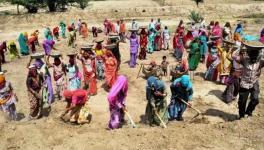Misleading’ Statement Puts Centre’s Commitment Towards MGNREGA in Question
Representational use only.
Activists have questioned the Centre’s response to media reports on the shortage of available funds for the rural employment guarantee scheme in the current financial year, by alleging that it is “misleading” and that it leaves many raised questions “unanswered.”
Last week on Saturday, the Narendra Modi – led central government said that it is “committed” to the proper implementation of the Mahatma Gandhi National Rural Employment Guarantee Act (MGNREGA) and assured the “release funds for wages and material payments”, as per the law, whenever required.
The press statement issued by the Union Ministry of Rural Development (MoRD), which monitors the implementation of the jobs scheme in association with state governments, came in response to a report by a civil society group that indicated that the generation of employment under the scheme in the upcoming months will be hugely impacted since almost all of the allocated fund for this financial year has already been utilized.
Almost 90% of the Rs. 73,000 crore allocated as the budget for MGNREGA in the fiscal year 2021-22 have been utilized, found the “NREGA National Tracker” report for the April-September period of this year, authored by People’s Action For Employment Guarantee (PAEG). It added that as many as twenty states in the country including Andhra Pradesh, Madhya Pradesh, Rajasthan, Tamil Nadu and West Bengal among others have a negative net balance – total funds available minus total expenditure and the payments due for expenses incurred in the current year.
Moreover, in a study of 18 lakh wage transactions, under the rural jobs scheme, in 10 states during the same period, Bengaluru-based LibTech India found that 71% of the transactions by the central government exceeded the mandated period.
According to the Act – the scheme that provides up to 100 days work per household per year – the payment of wages to the workers is mandated to be completed within 15 days of completion of a muster roll of work, failing which the workers enrolled under the scheme are entitled to a delay compensation of 0.05% per day the wages earned.
Saturday’s response by the Centre “leaves many questions unanswered”, and its promise of providing work under the scheme based on demand “appears vacuous,” said PAEG in a press statement on Monday.
Centre on Saturday had claimed that so far during the current financial year, Rs 63,793 crore has been released to states/union territories, out of which Rs 8,921 crore is available with the latter to meet the wage liability.
However, an analysis of the financial statement of MGNREGA as of Monday by PAEG shows that the cumulative expenditure for the ongoing financial year is Rs 52,993 crore, while the pending liability for the same currently stands at Rs. 9,075 crore. Moreover, the total pending liabilities from the previous financial year is Rs. 17,451 crore.
“This adds up to Rs 79,518 crore implying that the GoI is already running a deficit of at least Rs 6,518 crore already. This has [also] resulted in mounting wage delays,” said PAEG on Monday.
Nikhil Dey, founder member of Mazdoor Kisan Shakti Sangathan, on Tuesday, told Newsclick that the PAEG’s report highlights that there is an “urgent” need to make adequate funds available for the rural jobs programme. He pointed out that the total budget allocation for the said scheme was, to begin with, 34% less than the revised budget for the previous year.
“MGNREGA, that is the lifeline of the rural workforce, is as per law never constrained by budget but by demand,” Dey, who is also a PAEG’s working group member, said. This means, he added, that it is the “statutory obligation” of the central government to ensure that adequate funds are available for the MGNREGA and that the workers receive their work and payment on time.
According to him, there was already extreme distress within the rural workforce, which only worsened since last year due to the COVID-19 pandemic. “The delay in wage payments [under MGNREGA] results in mounting debt over distress for the rural workers,” Dey said.
Meanwhile, the Centre on Saturday also claimed that its controversial decision, taken earlier this year, to divide wage payments under the rural jobs scheme into separate caste categories, is further being “streamlined.”
On March 2 this year, the MoRD had sent an advisory to all state governments, directing them to divide wage payments under the employment guarantee programme into separate categories for Scheduled Castes (SCs), Scheduled Tribes (STs) and others from 2021-22 financial year.
This move, which is “at odds with the universality” of the rural scheme has prompted “caste-based and religious tensions” among workers in villages and has also increased the workload of the officials who oversee the implementation of the scheme at the village block levels by “at least 3 times,” said LibTech India last week.
On Monday, the PAEG reiterated that the caste-based segregation of wage payments under MGNREGA is “futile and legally questionable.” It demanded that the said move needs to be rescinded immediately
Get the latest reports & analysis with people's perspective on Protests, movements & deep analytical videos, discussions of the current affairs in your Telegram app. Subscribe to NewsClick's Telegram channel & get Real-Time updates on stories, as they get published on our website.






















